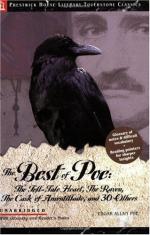Of all these mystical cadences, the plaint of The Raven, vibrating through the portal, chiefly has impressed the outer world. What things go to the making of a poem,—and how true in this, as in most else, that race which named its bards “the makers”? A work is called out of the void. Where there was nothing, it remains,—a new creation, part of the treasure of mankind. And a few exceptional lyrics, more than others that are equally creative, compel us to think anew how bravely the poet’s pen turns things unknown
“to
shapes, and gives to airy nothing
A local habitation, and a
name.”
Each seems without a prototype, yet all fascinate us with elements wrested from the shadow of the Supernatural. Now the highest imagination is concerned about the soul of things; it may or may not inspire the Fantasy that peoples with images the interlunar vague. Still, one of these lyrics, in its smaller way, affects us with a sense of uniqueness, as surely as the sublimer works of a supernatural cast,—Marlowe’s “Faustus,” the “Faust” of Goethe, “Manfred,” or even those ethereal masterpieces, “The Tempest” and “A Midsummer Night’s Dream.” More than one, while otherwise unique, has some burden or refrain which haunts the memory,—once heard, never forgotten, like the tone of a rarely used but distinctive organ-stop. Notable among them is Buerger’s “Lenore,” that ghostly and resonant ballad, the lure and foil of the translators. Few will deny that Coleridge’s wondrous “Rime of the Ancient Mariner” stands at their very head. “Le Juif-Errant” would have claims, had Beranger been a greater poet; and, but for their remoteness from popular sympathy, “The Lady of Shalott” and “The Blessed Damozel” might be added to the list. It was given to Edgar Allan Poe to produce two lyrics, “The Bells” and The Raven, each of which, although perhaps of less beauty than those of Tennyson and Rossetti, is a unique. “Ulalume,” while equally strange and imaginative, has not the universal quality that is a portion of our test.
The Raven in sheer poetical constituents falls below such pieces as “The Haunted Palace,” “The City in the Sea,” “The Sleeper,” and “Israfel.” The whole of it would be exchanged, I suspect, by readers of a fastidious cast, for such passages as these:
“Around, by lifting winds
forgot,
Resignedly beneath the sky
The melancholy waters lie.
No rays from the holy heaven come down
On the long night-time of that town;
But light from out the lurid sea
Streams up the turrets silently—
* * *
Up many and many a marvellous shrine
Whose wreathed friezes intertwine
The viol, the violet, and the vine.
* * *
No swellings tell that winds may be
Upon some far-off happier sea—
No heavings hint that winds have been
On seas less hideously serene.”




